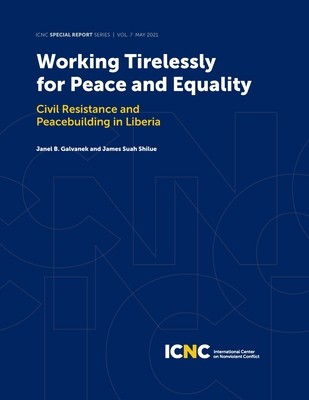
- We will send in 10–14 business days.
- Author: Janel B Galvanek
- Publisher: International Center on Nonviolent Conflict
- ISBN-10: 1943271410
- ISBN-13: 9781943271412
- Format: 21.6 x 27.9 x 0.3 cm, minkšti viršeliai
- Language: English
- SAVE -10% with code: EXTRA
Reviews
Description
From the establishment of the Liberian state in 1847, the government's indirect rule over the majority indigenous Liberian population was oppressive and exploitative, and in 1980 the settler government was overthrown. But instead of uniting Liberians, the first indigenous Liberian president presided over a 10-year dictatorship, followed by a brutal civil war that lasted until 2003.
In this case study, we examine the methodologies and approaches of the various actors involved in civil resistance and peacebuilding throughout each phase of conflict in Liberia. Organizations like the Inter-Religious Council of Liberia, the Mano River Women's Peace Network, and the Catholic Justice and Peace Commission worked for peace and advocated for democratic change throughout the civil war. Then in 2003, the Mass Action for Peace began organizing protests, sit-ins, and vigils to actively pressure the warring parties to come to an agreement. These actors pursued strategies of peacebuilding and civil resistance simultaneously, which led to the complementarity of their work and increased the impact they had on the peace process.
- Author: Janel B Galvanek
- Publisher: International Center on Nonviolent Conflict
- ISBN-10: 1943271410
- ISBN-13: 9781943271412
- Format: 21.6 x 27.9 x 0.3 cm, minkšti viršeliai
- Language: English English
From the establishment of the Liberian state in 1847, the government's indirect rule over the majority indigenous Liberian population was oppressive and exploitative, and in 1980 the settler government was overthrown. But instead of uniting Liberians, the first indigenous Liberian president presided over a 10-year dictatorship, followed by a brutal civil war that lasted until 2003.
In this case study, we examine the methodologies and approaches of the various actors involved in civil resistance and peacebuilding throughout each phase of conflict in Liberia. Organizations like the Inter-Religious Council of Liberia, the Mano River Women's Peace Network, and the Catholic Justice and Peace Commission worked for peace and advocated for democratic change throughout the civil war. Then in 2003, the Mass Action for Peace began organizing protests, sit-ins, and vigils to actively pressure the warring parties to come to an agreement. These actors pursued strategies of peacebuilding and civil resistance simultaneously, which led to the complementarity of their work and increased the impact they had on the peace process.


Reviews